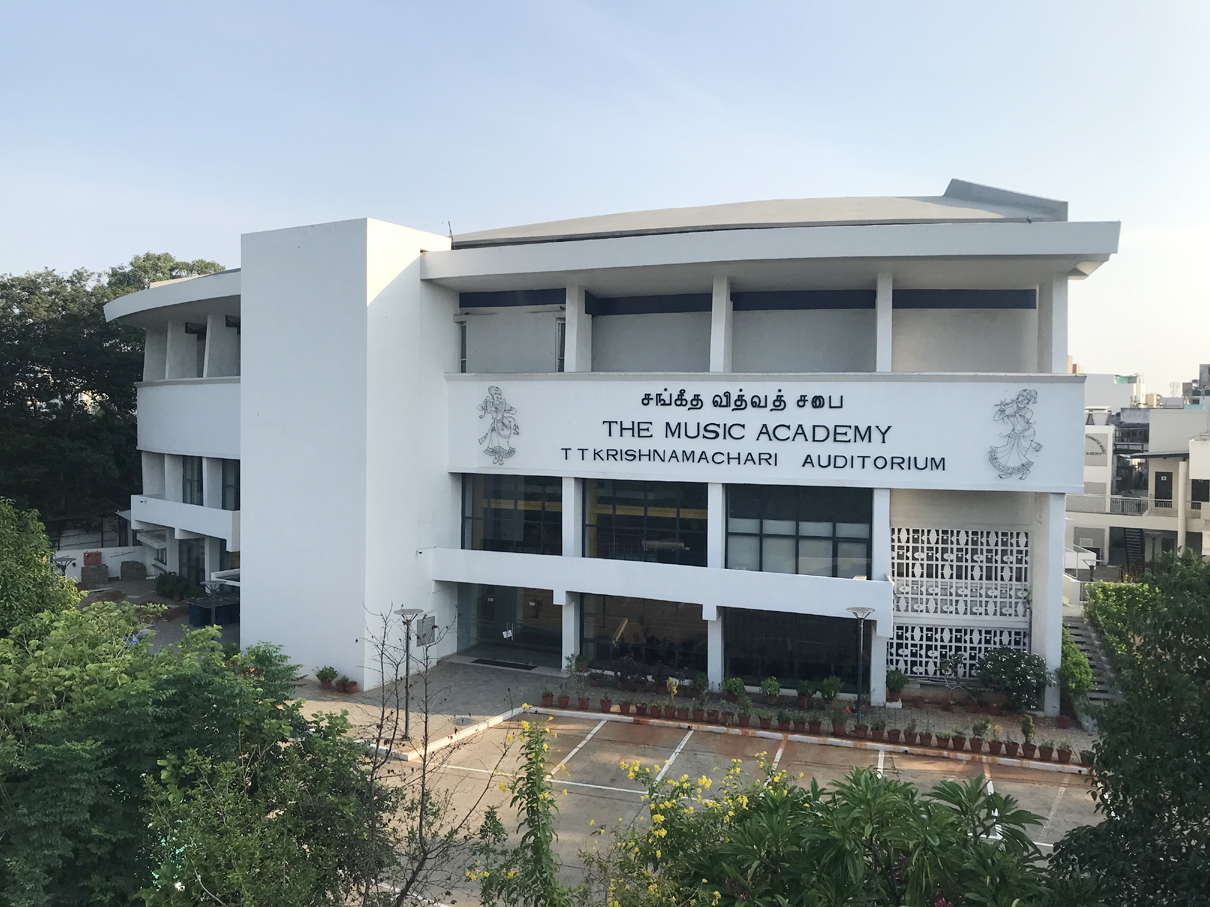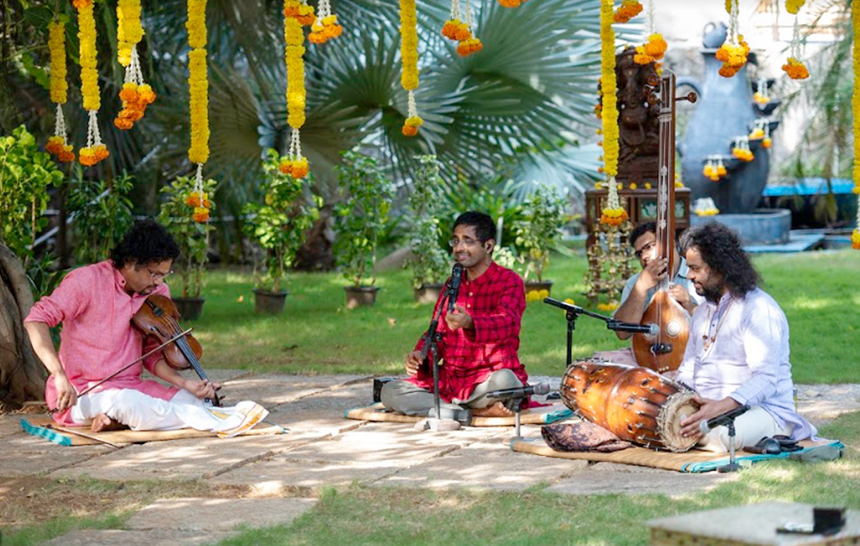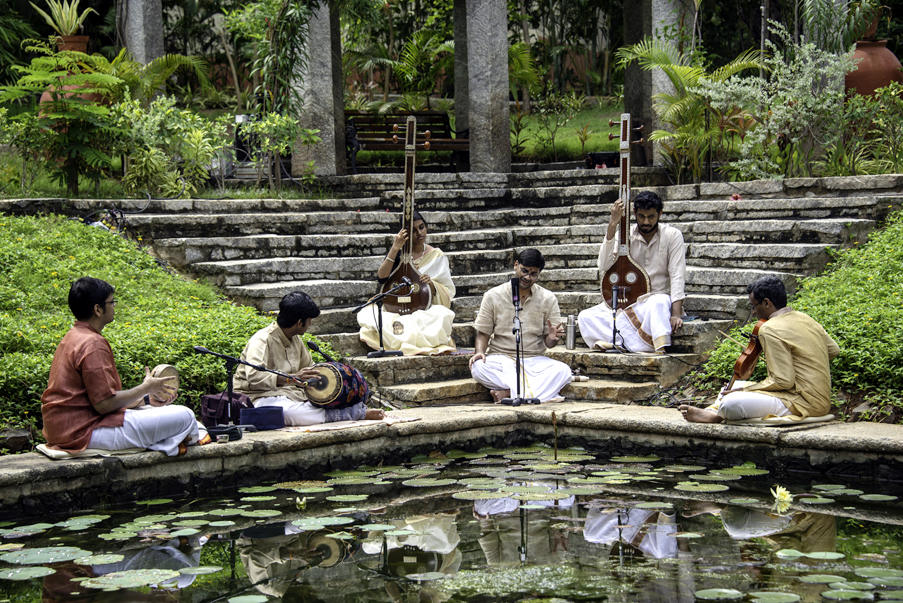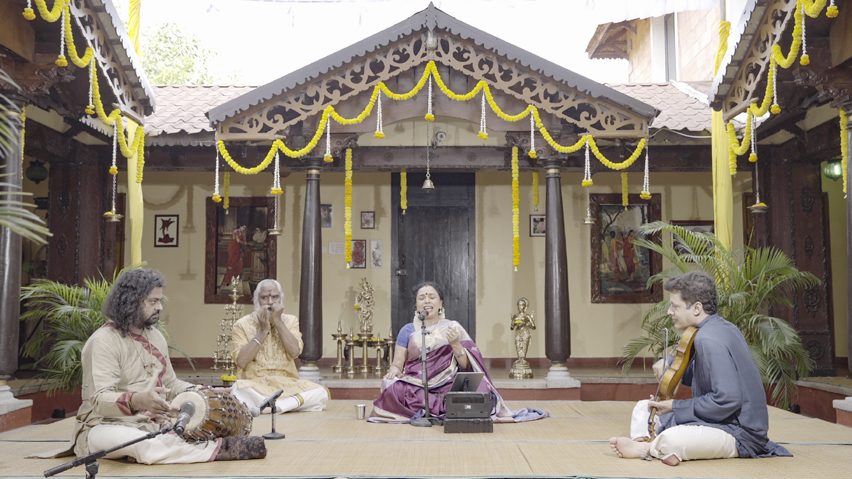Registered with the Registrar of Newspapers for India under R.N.I 53640/91
Vol. XXX No. No. 15, December 1-15, 2020
The ‘new normal’ Kutcheris of Margazhi 2020
by Padmaja Jayaraman
In 1965, a ten-year old boy, R. Radhakrishnan, attended Chitti Babu’s Veena concert at Sri Rama Samajam in T. Nagar. He was awed by the ‘Kuyil’ sound that emanated from the veena when Chitti Babu played a Bharathiyar Song. He trotted back home with fascination, and a new thirst for Carnatic music.

R. Jayanthi, a nine-year old girl in 1968 had gone to T.N. Seshagopalan’s concert at Tyagaraja Vidwath Samajam in Mylapore. She recalls how she was mesmerised by his gripping voice that day. Only if Jayanthi and Radhakrishnan realised then that they would get married, settle in the US and plan their visits to India to not miss their favourite artistes performing in the Sabhas of Madras.

Margazhi kutcheris are predominantly donning a virtual garb this year. “I am really happy that organisers have taken that extra step to not miss the Margazhi tradition of kutcheris, and are providing virtual concerts as a substitute for audiences across the world”, says Sudha Raghunathan, the Carnatic star.

The Federation of City Sabhas (FCS) is organising a series of more than 70 virtual concerts from December 15, 2020 to January 15, 2021 via Vimeo, for members. Others can watch it via Kalakendra YouTube channel. “The general public may have to pay around Rs. 3,000 for the entire season to watch the kutcheris,” reveals Harishankar Krishnaswami, the secretary of the FCS which comprises Brahma Gana Sabha, Hamsadhwani, Karthik Fine Arts, Narada Gana Sabha, Rasika Ranjani Sabha, Sri Krishna Gana Sabha, Sri Parthasarathy Swami Sabha and Sri Thyaga Brahma Gana Sabha.

“We planned to do a stage concert in the beginning of 2020 but had to cancel it due to the pandemic. So, we are going virtual this year,” confirms Mahesh Venkateswaran, the founder of MadRasana. They have chalked out a six-day programme from December 18 to December 23, 2020. The virtual concerts were recorded in outdoor settings – in Rina’s Avenue, ECR and in Kalakshetra. “We want to capture nature, with the birds chirping and the leaves rustling. One of the concerts was even shot in the rain”, says Mahesh. Each day, there would be one artiste performing from 6.30 to 9 pm. The season pass is for Rs. 2,600, while the ticket for each concert is Rs. 500.
The Music Academy is also taking the virtual route this Margazhi with the support of HCL Concerts. The programme is scheduled from December 24 to 31, 2020. “The ticket-link will come up in the Music Academy website by early December where people can pay. The senior concerts are paid while the junior and sub-senior concerts are free”, informs V.
Sriram, secretary of Music Academy. Each senior concert is priced at Rs. 250, and the season pass is Rs. 3,000. The concerts will be priced at USD 10 for those logging in from overseas, with a season ticket being USD 120. Those who buy a season ticket therefore get 15 concerts for the price of 12. The concerts will be free for viewing by the members of the Music Academy, all of whom will receive a link via email.
Though most of the Sabhas of Madras are going virtual this Margazhi, Bharatiya Vidya Bhavan has resorted to the good old live concerts. “For decades, we have been having live concerts and we didn’t want to change that. The government has given permission to hold live kutcheris too”, says K.N. Ramaswamy, BVB’s director. The concerts will take place at the open-air premises in Bhavan’s Rajaji Vidyashram School, Kilpauk from November 28 to December 19 2020.
There would be temperature-checking, hand-sanitisation, and distanced-seating arrangements in the premises. They would even provide masks if the audience are not wearing proper ones. Since the concerts are free, entry will be on a first-come-first-serve basis, with a limit of 200 people in the premises. Drive-in car facilities will also be available, a maximum of fifty cars being allowed.
“I have thoroughly enjoyed kutchery kitchens run by stalwarts like Chellappa, Pattappa, Mount Mani and Arusuvai Natarajan. That was also one of the reasons for attending the concert in person”, reminisces Radhakrishnan. Even though the concerts are going mostly virtual, the organisers are planning to revamp the kutchery food services online. “The caterers will set up multiple stalls all over the city and supply food during the concert duration with the help of apps like Swiggy and Dunzo”, says Harishankar. BVB will be giving food packets to the audience consisting of different items at the end of each concert.
Radhakrishnan’s uncle, 82-year-old R. Vanchinathan goes crazy over Carnatic music concerts. But he is not tech savvy enough to operate a gadget and watch a virtual kutchery. To help senior Rasika-s like him to watch the virtual concerts, MadRasana has partnered with an elderly-care service centre, Prayojana, which will offer technical support via phone or in person.
It has been a different experience for performers too. Most of their concerts were recorded prior to the Season, which will be aired on the scheduled dates. Sudha Raghunathan shares her ‘major missings’: “It was like celebrating Diwali without crackers. The interaction between the audience and us was missing. The energy we create for the rasika-s is given back by them in the form of applause or standing ovations. Some rasika-s come to the back-stage and give me feedback; some even comment that my saree looks good.” But it was not a bed full of thorns for the performers, there were some ‘roses’ too.
“One good thing is you could schedule and reschedule [virtual concerts]. For live concerts, the schedule is usually made one year prior. In this virtual world, it is a lot more flexible. So we can easily change the date. Suppose we say that the co-artistes are not available on Monday, then the organisers would ask us to come on Tuesday, which won’t be possible in the case of live concerts,” remarks singer Sandeep Narayan.
The duration of virtual kutcheris is going to be shrunk to two hours, in contrast to the three-hour live kutcheris. According to Harishankar, although the virtual kutcheris would be of the same format as the live ones, the number of items would be lesser in a vocal concert. “In a Harikatha, it consists of a story, with little music intermittently used. It doesn’t matter if the concert is for three hours or two hours. I have to speak on the topic in the given time”, says Harikatha artiste, Dushyanth Sridhar.
Sudha urges rasika-s to have a mindset to accept the fact that, even though it is virtual, efforts are being taken to organise kutcheris. They need to optimise their enjoyment of the concert. They have to formally sit, and not cook or do something while listening to the kutcheri; that will take away the special flavour of watching a concert. They have to create the concert ambience in the comfort of their homes.”
Picture captions: Above: Abhishek Raghuram and below: Ramakrishnan Murthy.
Sudha Raghunathan. All pictures (except the Music Academy) courtesy: MadRasana.

